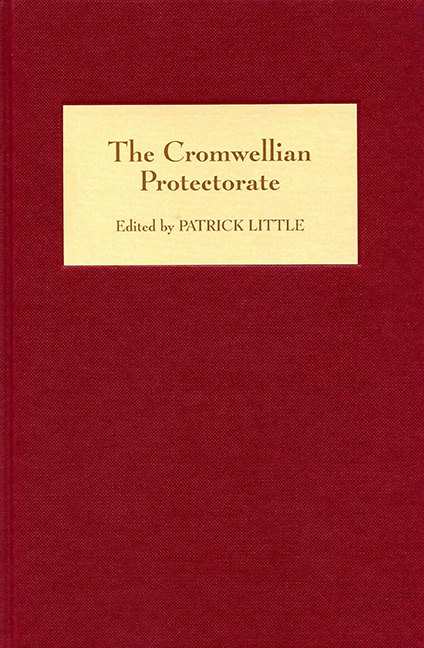Book contents
- Frontmatter
- Contents
- List of Illustrations
- Preface
- Notes on Contributors
- Abbreviations
- 1 Introduction
- 2 Oliver Cromwell and the Protectorate Parliaments
- 3 The Protector Humbled: Richard Cromwell and the Constitution
- 4 Cromwellian Style: The Architectural Trappings of the Protectorate Regime
- 5 Oliver Cromwell and the Council
- 6 ‘To Create a Little World out of Chaos’: The Protectoral Ordinances of 1653–1654 Reconsidered
- 7 The Irish and Scottish Councils and the Dislocation of the Protectoral Union
- 8 ‘This Murmuring and Unthankful Peevish Land’: Wales and the Protectorate
- 9 Cromwellian Towns in the Severn Basin: A Contribution to Cis-Atlantic History?
- 10 Policing the Cromwellian Church: The Activities of the County Ejection Committees, 1654–1659
- Index
8 - ‘This Murmuring and Unthankful Peevish Land’: Wales and the Protectorate
Published online by Cambridge University Press: 24 October 2017
- Frontmatter
- Contents
- List of Illustrations
- Preface
- Notes on Contributors
- Abbreviations
- 1 Introduction
- 2 Oliver Cromwell and the Protectorate Parliaments
- 3 The Protector Humbled: Richard Cromwell and the Constitution
- 4 Cromwellian Style: The Architectural Trappings of the Protectorate Regime
- 5 Oliver Cromwell and the Council
- 6 ‘To Create a Little World out of Chaos’: The Protectoral Ordinances of 1653–1654 Reconsidered
- 7 The Irish and Scottish Councils and the Dislocation of the Protectoral Union
- 8 ‘This Murmuring and Unthankful Peevish Land’: Wales and the Protectorate
- 9 Cromwellian Towns in the Severn Basin: A Contribution to Cis-Atlantic History?
- 10 Policing the Cromwellian Church: The Activities of the County Ejection Committees, 1654–1659
- Index
Summary
As Barry Coward noted in his recent volume on the protectorate, the history of Wales under Cromwell ‘has not received a great deal of attention’, a situation in marked contrast to the flowering of recent literature dealing with Ireland and Scotland in the 1650s. What writing there has been on the interregnum in Wales is dominated by the activities of the commission for the propagation of the gospel in Wales between 1650 and 1653, while for the protectorate period, the opposition of the ‘metropolitan of the itinerants’, the Fifth Monarchist Vavasor Powell, who penned the anti-protectoral Word for God, with his ‘little Welsh army’, assumes centre stage. This focus on the activities of the propagation commission and radicals like Powell testifies to some of the major preoccupations of Welsh historiography which have emerged from the Liberal and nonconformist backgrounds of many of its practitioners. Consequently, interregnum Wales has been viewed primarily through the eyes of the radical puritan caucus who are often portrayed as providing the initial, heroic bridgehead for later nonconformist advancements in the country. As a result, apart from the opposition of Powell, the protectorate has been something of a lacuna in Welsh historiography, a footnote to the dynamism of the propagation era and a prologue to the heroic resistance of Welsh nonconformists to the Penal Code.
Although this chapter endorses the importance of the propagation commission in shaping the contours of public debate in Wales after 1653, it seeks rather to explore the legacy of the propagation experiment in alienating significant sections of the Welsh population from all republican regimes. It demonstrates how propagation not only planted cells of nonconformist piety in Wales, but also produced a significant body of critical opinion which impeded the process of ‘healing and settling’, especially during the early protectorate. The propagation commission cast a long shadow over the later 1650s which has been neglected by previous commentators who understandably have focused on the light and heat generated by the dynamic Powell.
- Type
- Chapter
- Information
- The Cromwellian Protectorate , pp. 144 - 164Publisher: Boydell & BrewerPrint publication year: 2007



